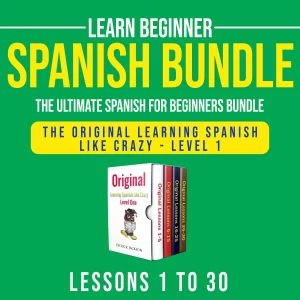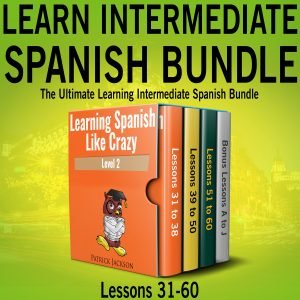The Past Participle
In this Spanish lesson we will learn the Past Participle and its different uses. Although this lesson is actually briefer than past lessons, the Past Participle is very important if you want to learn how to speak Spanish. Its formation is quite simple. As in English, the Past Participle in Spanish is a central element in most topics of discussion.
In general, the Past Participle is best understood as having 4 distinct uses that include past and present actions, and adjectives. Although this range in usage seems broad, understanding each particular use can be learned and applied rather easily with practice.
The Past Participle is rather simple to form. For -ar verbs, an –ado is added to the verb’s stem.
For example:
The stem of the verb hablar (to speak) is habl. With this in mind, an –ado is added to habl to form the Past Participle for hablar: hablado.
The formation of the Past Participle for –er and –ir verbs parallel this pattern. However, an –ido is added to the er or ir verb’s stem.
For example:
In the case of the verb beber (to drink), its stem is beb. An –ido is then added to beb to form its Past Participle: bebido.
Similarly, to form the Past Participle for salir (to go out) an –ido is added to its stem, sal. Its Past Participle is: salido.
With the Past Participle’s basic format in mind, what follows are examples of it for both regular and irregular verbs:
Examples of the Regular Past Participle:
Infinitive Past Participle
estar (to be) estado
bailar (to dance) bailado
cenar (to eat supper) cenado
almorzar (to eat lunch) almorzado
desayunar (to eat breakfast) desayunado
limpiar (to clean) limpiado
dar (to give) dado
llorar (to cry) llorado
lloviznar (to drizzle) lloviznado
tener (to have) tenido
creer (to believe) creido
leer (to read) leido
querer (to want, to love) querido
partir (to leave) partido
ir (to go) ido
vivir (to live) vivido
dormir (to sleep) dormido
Examples of the Irregular Past Participle:
Infinitive Past Participle
poner (to put) puesto
ver (to see) visto
volver (to return) vuelto
resolver (to resolve) resuelto
escribir (to write) escrito
abrir (to open) abierto
hacer (to make) hecho
satisfacer (to satisfy) satisfecho
morir (to die) muerto
decir (to say) dicho
cubrir (to cover) cubierto
The 4 main uses of the Past Participle are as follows:
1. The Past Participle is often used in compound tenses with the auxiliary verb haber (to have). We have seen this use in the Lesson on the Present Perfect Tense. In the Present Perfect Tense the past participle of the sentence’s main verb is added to haber to express a past action that has not completely elapsed.
Let’s briefly review this use:
Juana ha estado en su cuarto todo el día.
(Juana has been in her room all day)
He querido ir a California.
(I have wanted to go to California.)
Mario ha vivido en Bogotá.
(Mario has lived in Bogotá.)
2. The Past Participle is used for the passive voice and usually follows the verbs ser or estar (to be). When the Past Participle reflects the passive voice, it must agree with the subject’s gender and number.
For example:
El papá de Diego está herido.
(Diego’s father is hurt.)
La hermana de Rogelio está cansada.
(Rogelio’s sister is tired.)
3. At times, the verbs llevar and tener are used instead of the verb haber in compound tenses (as in the Present Perfect Tense). When this occurs, the Past Participle must agree with the attribute’s gender and number. Although this use may seem awkward, think of it as forming an alternative expression for indefinite past actions.
For example:
Tengo hecha la comida.
(I have made the food.)
Juan lleva pagada la cuenta.
(Juan has paid the check.)
4. The Past Participle can also be used as an adjective. Keep in mind that for this use, the Past Participle acts as an adjective and must agree in gender and number with the noun.
For example:
Un vestido hecho a mano
(A dress made by hand)
Un hombre educado
(An educated man)
Un bebé mimado
(A spoiled baby)
Now let’s try a few exercises. Translate the following into Spanish. The answers follow the exercise.
1. An opened door
2. A cleaned room
3. We have spoken.
4. Juan has cooked.
5. A cooked chicken
6. Roberta’s brother is tired.
7. Juana’s mother is educated.
8. Marcos has made the dessert.
9. She has opened the door.
10. Have you seen Milagros?
Answers:
1. Una puerta abierta
2. Un cuarto limpiado
3. Hemos hablado.
4. Juan ha cocinado.
5. Un pollo cocinado
6. El hermano de Roberta está cansado.
7. La madre de Juana es educada.
8. Marcos tiene hecho el postre.
9. Ella ha abierto la puerta.
10. ¿Has visto a Milagros?





